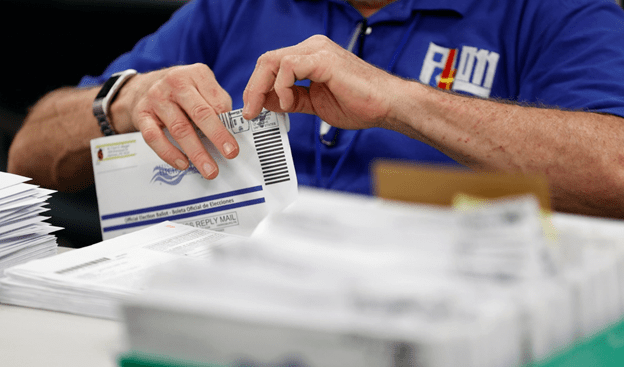
In the advent of the up-coming 2022 Philippine presidential elections, Commission on Elections (Comelec) Commissioner Rowena Guanzon is pushing for “mail-in-voting” because she believes that it will facilitate a higher-voters’ turn-out.
In a Twitter post, Guazon said, “look at US (United States) and Korea’s Elections. Their mail voting works. More PWDs, elderly, pregnant women can vote if by mail.”
It can be recalled that last September 2020, Marikina (2nd District) Representative Stella Quimbo filed House Bill 7572, which will allow senior citizens to vote by mail amid the coronavirus (COVID-19) pandemic. Guazon supports this legislative measure.
A counterpart legislative measure, – Senate Bill 1870 or the “Voting By Mail Act” was filed by the Chair of the Senate Committee on Electoral Reforms, Senator Imee Marcos at the senate. “Let’s not discriminate against senior citizens, pregnant women, persons with disability (PWDs), and indigenous peoples (IPs) who should be given the option to mail in their votes,” Marcos said.
However several political personalities like Senate President Vicente Sotto are not in favor of a mail-voting scheme. Sotto said, “I’m not in favor. It is the “easiest system of voting to cheat.”
Even a member of the political opposition, Senate Minority Leader Franklin Drilon is not in favor of a “mail-in voting system” at this time. “I am not so keen nor am I convinced that our system can adapt to a mail-in voting system. We do not have the infrastructure needed to assure our people that voting by mail will reflect the true intent of our people. Mail-in voting would be difficult to monitor. Our current system simply does not permit voting by mail as a process that will accurately reflect the will of the people. I am opposed to it at this time. We can look at it again in the future,” Drilon said.
Meanwhile, most Filipinos are not in favor of mail-in-voting according to a poll survey conducted by Comelec. Close to half of those who participated in the said survey do not want to cast their votes via mail voting.
Comelec spokesperson James Jimenez posted in his Twitter account that 43 percent of those who participated in the poll survey is not in favor of the proposed mail-in voting scheme, while, a total of 35 percent would like to vote by mail, and 22 percent have questions regarding postal voting.
To note, postal voting is voting in an election where ballot papers are distributed to voters and typically returned by post-mail or electronically via an electronic voting system in contrast to voters voting in person at polling stations. Postal votes constitute a form of early voting and may be considered an absentee ballot/voting.
Hindsight and Perspective
The intention and objective behind the proposed “mail-in-voting” legislative measure are good but how to operationalize it in the Philippines context is a bit of a challenge and will be more or less problematic.
There are also these questions as to what will be the political consequences of such a voting scheme, whether the use of mail-in-ballots will open a “pandora’s box” of possibilities and propensity for massive electoral cheating, and whether it will likely increase the probability of electoral fraud in the country. Take note, Philippine elections since time immemorial, have always been blitzed and assailed by electoral fraud and cheating.
Mail-in-voting in the context of the Philippines will be a voting scheme that is more or less be prone and predisposed to massive “electoral cheating and fraud”. For one, mail-in ballots are at risk of being altered, stolen, or forged given the not so efficient postal service in the country.
There is also this challenge of ensuring that everything will be monitored accordingly starting from ensuring that voters’ signatures, relevant and personal information of mail-in ballots match the signatures, relevant and personal information on file, to the transmission of mail-in ballots to its designated precincts, ensuring that these ballots will not be tampered, tinkered, miscarried, misdelivered, be delayed, or lost along the way, or even be rejected on the pretext that there are discrepancies in voters’ signatures and personal/relevant information.
In a mail-in voting system, it is quite important as well to ensure and monitor that ballots are received and returned by voters who will go along with this voting arrangement on time. And this could be problematic again because of the not so efficient postal service in the country.
Just to note, a regular mail sent via the Philippine Postal Service will take a minimum of more than two to three weeks or at least a month to reach its destination, depending on how far that destination is from the post office where the mail has been sent. The farther it is, the longer it is for the mail to arrive at its destination.
Furthermore, the Philippine Postal Service has to postmark these mail-in ballots for Comelec or concerned election officials to determine if these ballots were mailed on time or not for counting purposes.
There’s even this question if indeed the Philippine Postal Service can accommodate and handle additional massive numbers of mails than what it already is handling at the moment, where ballots will be mailed out by Comelec or by concerned election officials, and then mailed back by voters.
Can this even be done without unnecessarily creating chaos and mass disenfranchisement, given that it is not even certain if the postal services of the country have the capacity, capability, infrastructures, and manpower to do all these monitoring tasks to ensure the sacredness and inviolability of the mail-in ballots?
All these are important concerns and considerations that need to be factored in if the country will adopt and adapt a mail-in-voting system this coming 2022 national elections to ensure fair, fraud-free, accurate, and uncompromised election results.
To note, addressing these concerns and issues raised related to the viability and practicability of the mail-in voting system if considered this 2022 elections, would require more or additional personnel who will take charge of all the monitoring work, including additional infrastructures for the monitoring component of the mail-in-voting scheme to work effectively, while securing the sanctity and authenticity of votes cast by each Filipino.
Thus, the adoption of a mail-in voting system will categorically require additional resources, infrastructures, and manpower.
On another note, though it is a valid argument and a genuine concern that those at risk and the most vulnerable from Covid-19 may opt to vote through the mail-in voting system, it is most likely, if not hopefully, that by May 2022, the majority, if not all Filipinos, are already Covid-19 vaccinated and the mail-in voting scheme is not as necessary as it is now that the pandemic is still prevalent and widespread in the country.
Optimistically, by that time, Filipinos even the most vulnerable sectors like the PWDs, senior citizens, IPs, and pregnant women may be able to go out and vote directly and in-person in polling precincts.
Conclusion
It seems that, if in any case Comelec and the legislatures are not careful, and if all the necessary safety nets, infrastructure, necessary manpower, and resources will not be dispensed in the event that a mail-in voting system will be adopted this 2022 national elections, instead of being a mechanism that may facilitate a higher voters’ turn-out and an electoral process that provides a wider opportunity for all, most particularly for the most vulnerable sectors of Philippine society (e.g., senior citizens, PWDs, IPs, and pregnant women) to exercise their sacred and political right to vote, the mail-in voting scheme could end-up as a recipe for massive disenfranchisement, electoral fraud, and cheating.
Source: Sovereign PH
https://sovereignph.com/2020/11/13/mail-in-voting-for-the-2022-national-elections/



